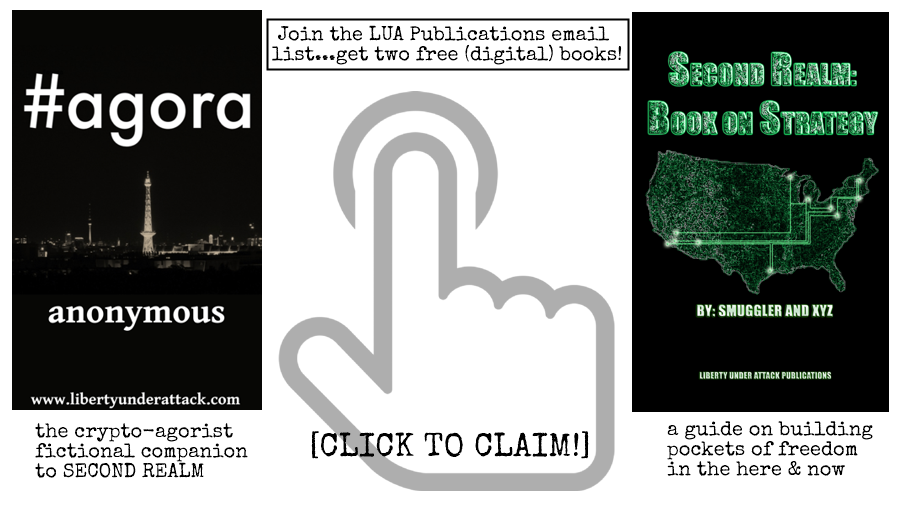Bitcoin: The Destroyer of the State?
Download the spoken discourse of this article.
Download a PDF version of this article.
By: Shane Radliff
June 16th, 2015
In the past 6 months or so, my world has expanded in some significant ways. First off, I’m researching and writing about many different things that I would have never seen myself taking an interest in.
On top of that, I’ve come in contact with quite a few people who have introduced me to some topics that have changed my outlook on the world completely.
One of those illuminating subjects was the world of crypto-anarchy.
The first important thing to get out of the way is this. I am not a programmer. Hell, I’m actually taking a summer class on website design, more specifically HTML and Java, probably the two most entry level things that most of the genius programmers today did when they were in middle school. It is safe to say then, that 99.9% of the details in the crypto-world go far over my head; but in this information age, information is easily available and I have been dying to learn more about this mind-blowing field.
I was told that it was easy; but the reality of it is rather different.
My Journey
It all started with my desire to make things difficult for the NSA by using Pretty Good Privacy (PGP) to encrypt my emails and by also using Jitsi, which incorporates Off the Record (OTR) and the Zimmerman Real Time Protocol (ZRTP) to provide end-to-end encryption in my instant messaging and VoIP calls.
At that point, I was re-introduced to Cody Wilson. I was well-aware of his accomplishment of 3D printing a firing gun, but when he did that, I was unaware of the importance. In addition to Wilson’s previous achievement, his organization, Defense Distributed, also released the Feinstein AK Mag as a sort of resistance against the ever-increasing regulations against the AR-15.
I understand the importance of both of those accomplishments now. Wilson showed that we are in a day and age where technology is one of the most successful forms of resistance against the State.
After I understood their importance, I began binge-watching interviews with Cody Wilson. In a few of those, I came across Amir Taaki, a Bitcoin project developer, and the intelligence of both of these gentlemen honestly astounded me. What drew me into them even more, was their understanding of the State’s regulatory powers and their drive to restore liberty through crypto-anarchy.
As Wilson explained in an interview with Adam Kokesh, crypto-anarchy is not necessarily a political philosophy; it’s more of a tool that can be used against the Establishment.
And a useful tool it is.
At that point in the story, I began learning about being “unbanked”, which is the FDIC’s term for those citizens who do not have a checking or saving bank account. One of the many aspects of my adventures into unbanking was finding alternative financial services (AFS) to pay for the various expenses in my life. I began investing in precious metals and looked for ways to cash my checks as well.
Another outlet that initially appeared promising were crypto-currencies.
It was at this point that I found Veldt Gold (previously known as Agora Commodities) and Suns of Liberty Mint, who both accept Bitcoin in exchange for silver bullion. I was extremely interested in avoiding Federal Reserve Notes (FRNs) altogether in my various investment avenues, and both of them provided just that.
From all that I’ve heard and seen, I imagined buying Bitcoin was, at least, relatively easy.
But boy, was I wrong.
Before I move forward, I will concede to one point. It’s probably not hard to buy Bitcoin through the various outlets that require you to add a bank account, yet, that virtually defeats the purpose of Bitcoin altogether.
Another thing that rattled around in my mind was the Silk Road debacle. It is much easier to get into the Deep Web than it is to buy Bitcoin. On that note, how many of these idiots who bought narcotics off of the Silk Road linked their damn bank account with an exchange website, like the former Mt. Gox, where they bought their Bitcoins?
My adventure in trying to buy Bitcoins, without using a bank account, took over a month. I signed up for over 10 accounts on 10 different websites and here is what I found:
- For over half of the sites, they forced you to add a bank account or otherwise verify personally identifiable information, such as by uploading a driver’s license or some other form of government identification; obviously, this is not privacy friendly.
- The other few sites I signed up for turned out to be overseas exchanges and it was pretty clear to witness the regulatory influence over Bitcoin, since the bureaucrats prohibited international trade using this crypto-currency.
The first observation, again, defeats the purpose of Bitcoin, unless you’re the Bitcoin Foundation and your ultimate goal is to incorporate it into the government approved “white market”. This is provable when you look at the “secret, behind closed doors meeting” the Bitcoin Foundation had with the bureaucratic regulatory powers here in the United States back in August of 2013.
As Cody Wilson said in an interview with The Conscious Resistance, “Everyone in Bitcoin… are the worst kind of hucksters and characters you’ve ever seen. They have nothing better to do though, they couldn’t make it in traditional banking and now they’re here fucking it up for the rest of us.”
The only positive that is coming from this complete betrayal of the true, non-reformist libertarian community (the small “L” is important in making the distinction from the Libertarian Party, which is not philosophically consistent with the twin libertarian axioms of non-aggression and self-ownership) is that Wilson and other programmers are in the process of coding and releasing Dark Wallet, which will, for the first time, anonymize Bitcoin transactions.
As another sort of resistance, Dark Wallet will be a way to combat the co-opting of Bitcoin under the hands of the regulators and their volksdeutche collaborators.
I personally have a major amount of respect for Wilson for not selling out and for going the next step in trying to fix the major mistake made by mainstream Beltway pseudo-Libertarians.
I also have been feeling his pain.
As I mentioned previously, I scoured the Internet for ways to buy Bitcoin. I am still banked at this point and would still be happy to pay with PayPal or by plastic card. But again, it wasn’t that easy.
Last night, a colleague shot me a link to a website that converts one type of crypto-currency into another, without having to create an account. I had my next bright idea (or so I thought at the time) and decided to try to buy Litecoin instead, thinking that it has to be easier than buying Bitcoin.
And here’s where the shit-show started.
I downloaded a Litecoin wallet and prepared for my purchase, in hopes of converting it to Bitcoin so I could make my next investment.
I did some searching around for the best and easiest way to buy Litecoin and somehow I came across a website called VirWox. It looked more promising than any other site I had come across and I was excited, after a month of searching, to finally be able to acquire some Bitcoin.
I signed up and all seemed well, until they asked for me to connect an “avatar”. I was confused by that, but it said optional so I said screw it and moved along (not smart, I know that now).
I deposited the maximum amount that they allowed (which was around $80) in each 24 hour span (which should have set off alarms in my head when you look at the price of one BTC), as the purchase I was going to make was around $160.
As far I why I chose “SSL”, I’m not quite sure, but for some reason I purchased the $80 worth of the “virtual currency”. It was at that point that I realized I just bought virtual video game money, rather than the crypto-currency I was trying to invest in.
Let’s just say, everything I went through prior to that began to make sense.
I was livid; and rightfully so.
During this misadventure, I was on a VoIP conference call and I was trying to figure out what had just transpired. The best alternative I could imagine was going to the bank tomorrow and seeing if they could reverse the funds.
I continued to dig through this “virtual currency” website to try to find out if there was any sort of remedy. Luckily, I found out that it was possible to convert the SSL “virtual currency” into Bitcoin.
So, I converted the bullshit gaming money into the crypto-currency I was trying to acquire in the first place. I definitely dodged a bullet but I did lose $10 in the process, as demonstrated in the screenshot pictured here.

Throughout this entire ordeal, I actually reached the goal I had been trying to achieve for over a month. And you know what it took? I had to waste $10 at a fucking virtual gaming currency exchange in order to acquire it without a bank account or without having to reveal too much of my private information. It’s almost as if the cost of privacy was not only an investment in time and labor to discover how to make this work in the first place, but also a kind of toll road fee in order to anonymously use this portion of the information superhighway.
I would really like to emphasize something for those who may be confused by my experience: it’s not like I’m someone that is just outright bashing Bitcoin (or crypto-currencies in general) because I’m a Federal Reserve loving statist or a Kenynsian central banking economist. I just know what I have gone through (and how long I have gone through it), in attempting to obtain Bitcoin, or more precisely, Litecoin so I could then convert it into Bitcoin.
The point is this: when it comes to anything relating to crypto-anarchy, if the creators want people to use their inventions, it must be user-friendly, regardless of whether it takes the form of Bitcoin, PGP, Pidgin, or anything else. Obviously, the intention of these open-source programs is for them to be used by anyone and everyone, as the ones I’ve discussed in this article, are intended to either provide privacy and prevent NSA snooping and/or to subvert the regulatory bureaucracy.
If it’s not user-friendly, then developers can’t expect a large amount of people to use it, especially when you consider that most people in this country, including too many Libertarians, still believe that voting actually matters.
So what did I learn? Bitcoin is not a very useful option in my quest in becoming unbanked, it is not user-friendly, and much like the telephone, it was not designed to safeguard individual privacy. Don’t get me wrong, I still believe it might become a useful tool someday, especially when Dark Wallet becomes available, yet, for now, I honestly think it is more trouble and costly than what it is worth.
For the foreseeable future, unless some other better options come along, I won’t be hedging my bets on Bitcoin being the destroyer of the State.
Podcast: Play in new window | Download
Subscribe: Apple Podcasts | Email | TuneIn | RSS




Pingback: Tyranny of the Code: The (Hopeful) End of Coinbase - Liberty Under Attack
Pingback: Tyranny of the Code: The (Hopeful) End of Coinbase - Bitcoin News Dose